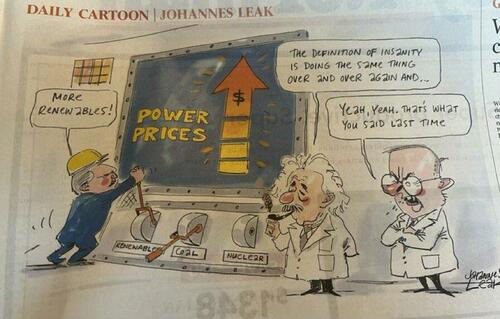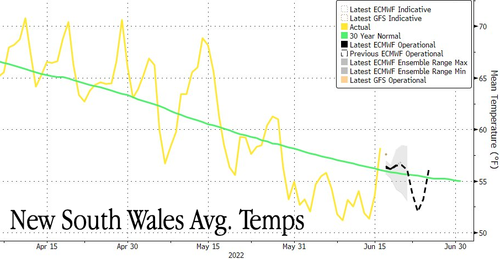
Australia's energy minister asked Sydney and the New South Wales (eastern part of the country) residents to turn off lights and energy-intensive appliances in the evening to prevent power blackouts due to an ongoing energy crunch, The Independent reports.
The federal energy minister, Chris Bowen, asked residents in a televised address to turn off energy-intensive devices between "6 to 8 [pm]" to mitigate risks of a spike in power during peak hours. He pointed to several offline coal-fired plants because of maintenance and unexpected issues.
Reuters notes that 65% of eastern Australia's power is generated by coal, but more than a quarter of that capacity is offline.
Wholesale electricity prices have soared and on Monday exceeded the capped price of A$300 per megawatt-hour. Above A$300, coal power generation plants lost money and forced some operators to shutter power generation units, thus removing energy capacity off the grid and sending prices even higher. The rise of power prices began when coal prices jumped following the Russian invasion of Ukraine.
Bowen snapped at a journalist when asked if more coal power is the answer the energy crunch.
Chris Bowen isn't having any of Uhlmann's 'wind doesn't always blow' rhetoric.
— Squizz (@SquizzSTK) June 16, 2022
"the rain doesn't always fall either, but we manage to store the water - we can store the renewable energy if we have the investment"#auspol pic.twitter.com/LjJkEr3zJy
"The situation in recent days has posed challenges to the entire energy industry, and suspending the market would simplify operations during the significant outages across the energy supply chain," Australian Energy Market Operator (AEMO) chief executive Daniel Westerman said in a statement.
"It was understandable generators had held back supply in light of the price caps along with unplanned outages and supply challenges with coal and gas, but having to direct generators to provide supply had made it impossible to maintain normal market operations," Westerman said.
Australia's dysfunctional power grid hasn't stopped at coal. In the last three weeks, declining solar output and periods of low wind have created power generation challenges, which have placed a heavier burden on fossil fuel generators.
Also, the coldest start to a winter season in decades is boosting heating demand and worsening the problem.
Australia better find a way to bring more coal power plants online or risk widespread blackouts amid high demand because of the winter chill.
Australia’s energy minister asked Sydney and the New South Wales (eastern part of the country) residents to turn off lights and energy-intensive appliances in the evening to prevent power blackouts due to an ongoing energy crunch, The Independent reports.
The federal energy minister, Chris Bowen, asked residents in a televised address to turn off energy-intensive devices between “6 to 8 [pm]” to mitigate risks of a spike in power during peak hours. He pointed to several offline coal-fired plants because of maintenance and unexpected issues.
Reuters notes that 65% of eastern Australia’s power is generated by coal, but more than a quarter of that capacity is offline.
Wholesale electricity prices have soared and on Monday exceeded the capped price of A$300 per megawatt-hour. Above A$300, coal power generation plants lost money and forced some operators to shutter power generation units, thus removing energy capacity off the grid and sending prices even higher. The rise of power prices began when coal prices jumped following the Russian invasion of Ukraine.
Bowen snapped at a journalist when asked if more coal power is the answer the energy crunch.
Chris Bowen isn’t having any of Uhlmann’s ‘wind doesn’t always blow’ rhetoric.
“the rain doesn’t always fall either, but we manage to store the water – we can store the renewable energy if we have the investment”#auspol pic.twitter.com/LjJkEr3zJy
— Squizz (@SquizzSTK) June 16, 2022
“The situation in recent days has posed challenges to the entire energy industry, and suspending the market would simplify operations during the significant outages across the energy supply chain,” Australian Energy Market Operator (AEMO) chief executive Daniel Westerman said in a statement.
“It was understandable generators had held back supply in light of the price caps along with unplanned outages and supply challenges with coal and gas, but having to direct generators to provide supply had made it impossible to maintain normal market operations,” Westerman said.
Australia’s dysfunctional power grid hasn’t stopped at coal. In the last three weeks, declining solar output and periods of low wind have created power generation challenges, which have placed a heavier burden on fossil fuel generators.
Also, the coldest start to a winter season in decades is boosting heating demand and worsening the problem.
Australia better find a way to bring more coal power plants online or risk widespread blackouts amid high demand because of the winter chill.








